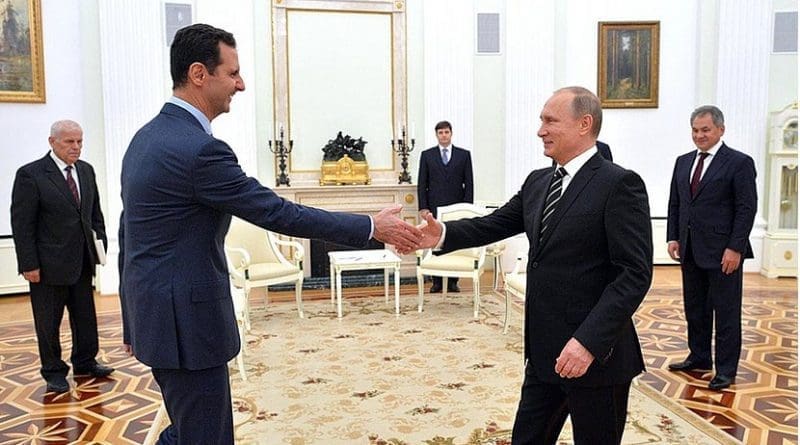How The Syrian Civil War Moved To Ukraine – OpEd
By Arab News
By Sinem Cengiz*
As the world has become “a single country” in the past century, a crisis in any one state becomes a matter of grave concern for the whole international community. It was obvious from the first day that Russia’s invasion of Ukraine was not only reshaping the European security order and threatening regional balance, but would also have its implications in conflicts elsewhere.
The Syrian civil war has brought death, destruction and mass displacement, and plunged the country into a complex and multilayered crisis. After 11 years, the Syrian opposition remains fragmented, and the legitimacy of its representatives is widely questioned both inside and outside Syria. Meanwhile a number of Arab states have begun to normalize ties with the Assad regime, which has regained most of the territory it had lost to the opposition thanks to extensive support from the man now driving the invasion of Ukraine, Russian President Vladimir Putin. Russia’s military intervention in Syria in 2015 was Moscow’s first significant engagement in the Middle East in decades, and changed the balance on the ground in favor of the regime.
The war in eastern Europe has further affected Syria as opposition and regime forces rolled up their sleeves to join the fight on opposing sides of a conflict hundreds of kilometers and a continent away. Russia has begun recruiting Syrians to fight in Ukraine, and other Syrians have said they will fight along with the country’s defenders. Syrians in the opposition-held northwest areas are keeping a close eye on the Ukrainian resistance, since they consider the enemy to be the same. On the 11th anniversary of the Syrian conflict, Ukrainian flags were visible in Idlib, with banners expressing solidarity with the Ukrainian people, and protesters said they wanted to fight for Ukraine against Russia.
However, the influence of Syrian opposition forces has waned in recent years as Iran and Russia steadfastly supported Syrian President Bashar Assad. Their ability to affect military developments on the ground has become limited to territories along the Turkish border.
The National Coalition for Syrian Revolutionary and Opposition Forces is reported to have closed its office in Ankara. The coalition was founded in Qatar a year after the civil war in Syria began, with its headquarters in Istanbul. Opposition sources said the closure was “temporary,” and rejected suggestions that it was a request by the Turkish government. Meanwhile, about 80 figures from the Syrian opposition met in Doha in early February to discuss ways to reorganize the opposition and make it more effective at the international level.
While the picture is therefore grim for the Syrian opposition, the Assad regime, one of Russia’s few allies, unsurprisingly voted against the UN General Assembly resolution condemning Russia’s invasion of Ukraine, while an overwhelming majority of countries voted in favor. In February, a few days before the invasion began, Syrian Foreign Minister Faisal Al-Miqdad met the Russian Foreign Minister Sergey Lavrov in Moscow. At thatmeeting, Syria declared its support for Russia’s recognition of the two breakaway “republics” in eastern Ukraine that presaged Russia’s invasion. On the day of invasion on Feb. 24, Putin spoke by telephone with Assad, who blamed the Western world for the chaos. With these moves, the Syrian regime seems to have paid its diplomatic debt to Russia.
This close coordination between Russia and the Assad regime indicates that Syria remains a priority for Moscow, as it is one arena where Russia and the West confront each other. However, there is a rising fear that Syrians, whichever side they are on in their own war, may join one side or the other in the Ukraine conflict, which may become in part the Syrian civil war redux. The two conflicts seem intertwined with the main actor, Russia, involved, and the course of the Syrian crisis will depend on Russia’s ability to accomplish its main aims in Ukraine in the short term. But no matter what is the stance of the regime or the opposition, or Moscow’s strategy at the moment, Syria is likely to face both the economic and security consequences of the war in eastern Europe.
- Sinem Cengiz is a Turkish political analyst who specializes in Turkey’s relations with the Middle East. Twitter: @SinemCngz

